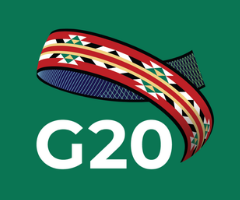The G20 is an international forum for governments and central bank governors from 20 major economies: Argentina, Australia, Brazil, Canada, China, France, Germany, India, Indonesia, Italy, Japan, Mexico, Republic of Korea, Russia, Saudi Arabia, South Africa, Turkey, the United Kingdom, the United States, and the European Union.
ARTIFICIAL INTELLIGENCE
AI and its implications for the economy and society have recently featured on the agenda of G20 ministers and country leaders who have expressed their commitment to a human-centred approach to artificial intelligence (AI).
In line with this commitment, in 2019 G20 Trade and Digital Economy Ministers adopted a set of non-binding G20 AI Principles to foster responsible stewardship of trustworthy AI. The ministers also issued several recommendations for member states, encouraging them to invest in AI research and development, foster the development of a digital ecosystem for trustworthy AI, shape an enabling policy environment for AI, and build human capacity and prepare for labour market transformation. In addition, governments were advised to actively co-operate to advance the AI principles; share AI knowledge; and promote the development of multistakeholder, consensus-driven global technical standards for interoperable and trustworthy AI.
The AI Principles were later endorsed by the G20 leaders at their Osaka meeting in June 2019. They noted the importance of fostering public trust and confidence in AI technologies, while also making reference to the growing importance of promoting security in the digital economy and of addressing security gaps and vulnerabilities.
BLOCKCHAIN
Crypto-assets have recently made it on to the agenda of G20 finance ministers and central bank governors, who are exploring their implications for national and international financial systems and the broader economy.
As noted in the communiqué issued at the end of their June 2019 meeting, G20 finance ministers and central bank governors consider that crypto-assets do not pose a threat to global financial stability at the moment, but that national and international institutions should remain vigilant to risks, including those related to consumer and investor protection, anti-money laundering, and countering the financing of terrorism. As such, they called on the Financial Stability Board (FSB) and other standard-setting bodies to monitor crypto-assets-related risks and consider work on additional multilateral responses, as needed.
The position of ministers and governors was reiterated by G20 leaders in their 2019 Declaration: ‘While crypto-assets do not pose a threat to global financial stability at this point, we are closely monitoring developments and remain vigilant to existing and emerging risks.’ At the same time, the leaders expressed their commitment to applying the Financial Action Task Force (FATF) Standards on virtual assets for the purpose of countering money-laundering and the financing of terrorism.
In February 2020, G20 finance ministers and central bank governors reiterated their position that potential risks arising from stablecoins and similar instruments (including risks related to financial stability, consumer and investor protection, monetary sovereignty issues, anti-money laundering, and countering the financing of terrorism) need to be evaluated and properly addressed before such instruments become operational. They also urged countries to implement the FATF Standards on virtual assets.
ARTIFICIAL INTELLIGENCE
- Committed to a human-centred approach to AI.
- Encourages governments to co-operate towards trustworthy AI.
BLOCKCHAIN
- Acknowledges that crypto-assets do not pose a threat to global financial stability at the moment, but encourages national and international institutions to continue to assess potential risks.
